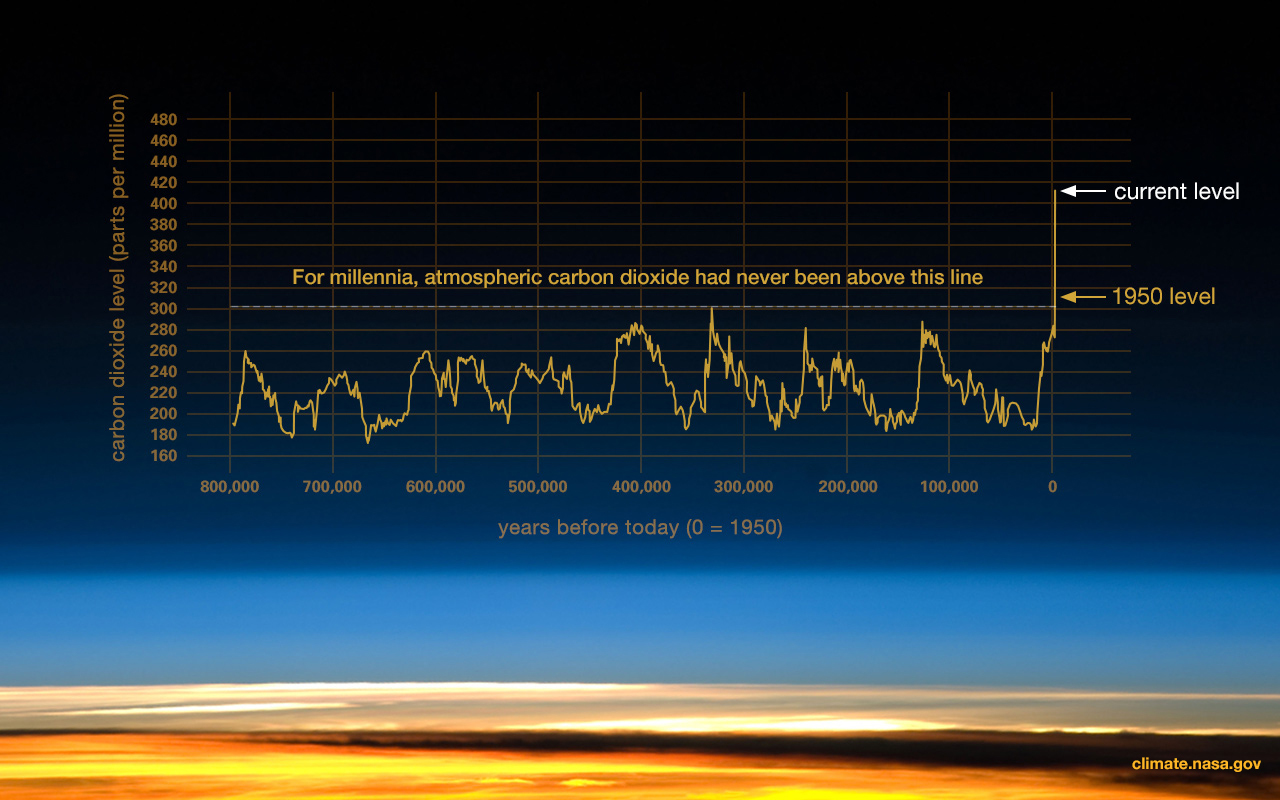Photo courtesy of NASA (climate.nasa.gov).
We’re at a turning point in the country where ecological prosperity is directly affected by economic drive. Embedded into our country’s economic system lie several ecological disasters that environmentalists are begging to be prevented and adjusted for.
Professor Robert Costanza, an ecological economics expert at the University of Vermont, describes what the concept of “ecological economics” really is. The “trans-disciplinary field,” described to Yale Insights, acts as “a bridge across not only ecology and economics but also psychology, anthropology, archaeology and history,” said Costanza. The concept aims to think about economics in a way that recognizes humans’ role in the environment. Humans are a part of other larger ecosystems that are all interdependent. Choosing environmental cooperation over capital greed is the kind of value that ecological economics brings, and we want to see more of this sustainable application as we deal with the increasingly complicated climate crisis.
In terms of physical sustainability, it would not hurt to also consider the differences between practicing a circular economy versus a linear economy. A linear economy — the kind of system we typically practice, where resources are used and discarded in order to feed mass consumption — assumes the waste created from it can be absorbed by our Earth without second thoughts. According to the Network for Business Sustainability, a circular economy, an approach popularized by climate change advocates, contains resources at their highest value for as long as possible, practicing sustainability and avoiding resource waste and a culture of one-time consumption. This can be applied on an individual level by thinking about how often we consume new technology, new products, new clothes. But the logic can be applied on grander terms throughout the country when large companies can control their mass extractions and resource demand.
James Gustave Speth, author of “The Bridge at the Edge of the World: Capitalism, the Environment, and Crossing from Crisis to Sustainability,” discusses these various topics in his writing. In the book, there is no solution to the climate crisis described other than to act on the various levels we can control: the economy being prioritized.
In order to take action with these concepts, the right people need to have the right tools to help the country grow toward its ecological betterment. Money seems to make the world go ‘round, so it is unavoidable to acknowledge the power of a federal budget. Under President Biden’s proposal for the 2022 federal budget, there would be about $36 billion totally accounting for fighting global climate change. The spending would divide into sections for areas such as research, infrastructure, transmission projects, clean energy sources and environmental justice initiatives. In contrast, this is only a small chunk of the fiscal budget in comparison to military spending. Under this proposal, the defense portion of the budget is expected to cost about $753 billion: over 20 times as much as the amount set aside for the climate crisis. Considering that the defense budget goes to nuclear weapons — which are known to contaminate our air and water supplies — the chunk of the budget dedicated to climate change seems to cancel out. It seems majorly counterintuitive to invest in cleaning up the atmosphere when the U.S. is still spending an exponentially larger amount of money on the very thing that contributes to its pollution.
Climate change is currently happening; it is no longer a problem to save for later. Before 1950, the Earth’s carbon dioxide levels had never reached above 300 parts per million. As of today, the number we are currently hovering around is 400 parts per million. Too much greenhouse gas in the atmosphere means the earth’s surface warms faster like a greenhouse, hence the popular term “greenhouse gas effect.” This kind of increase has already shown dangerous natural disasters: multiplying wildfires, vicious hurricanes, flooding and droughts. How can we possibly take a look around at our slowly suffering home environments and continue to prioritize the economic greed that seemingly got us into this mess in the first place?
A little over a year ago, I wrote one of my first environmental pieces about the new and anticipated Biden presidency at the time of the 2020 election season, to speculate what Joe Biden would do for climate change during his term. Although dubbed a “climate pioneer” by many, Biden’s climate promises to “build back better” were already expected to fall short of what we practically and statistically need to see happen with global temperature and environmental protection. Pushed into the forefront of climate politics, Representative Alexandria Ocasio-Cortez helped the Green Party to outline the Green New Deal, a massive policy that planned to change the United States economy and reach zero carbon emissions by 2030. Similarly, other countries such as Ireland and France have proposed their own government-level promises to reach carbon neutrality, convert to organic agriculture or set other ecological welfare goals by the next decade. The Green Party of the United States is still advocating for their plans and finding a way to worm its changes through congress. Hopefully, legislation and ecological advocacies can be taken seriously by enough of our lawmakers in time to save the planet. Hope is not as reliable as economic action, though, so it is time to reevaluate the way our “ecos” work together.
Kristine Kearns is a second-year English major with minors in Creative Writing and Sustainability. KK947319@wcupa.edu


[…] Click here to view original web page at wcuquad.com […]